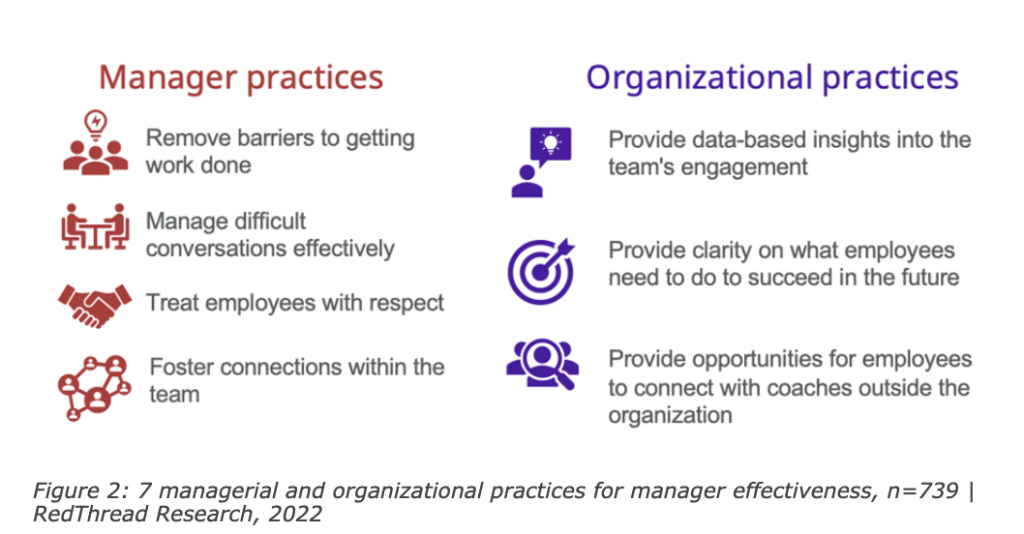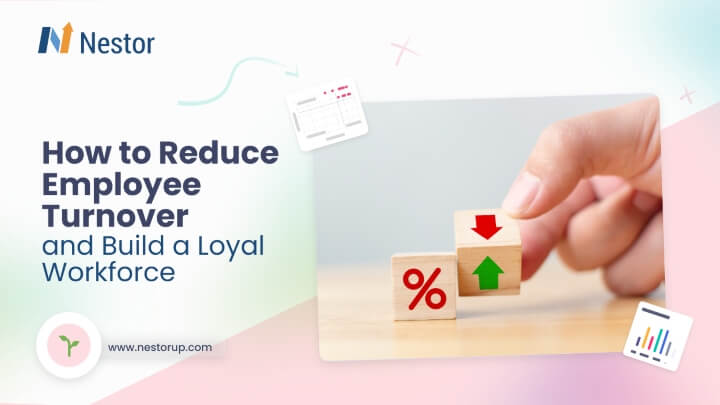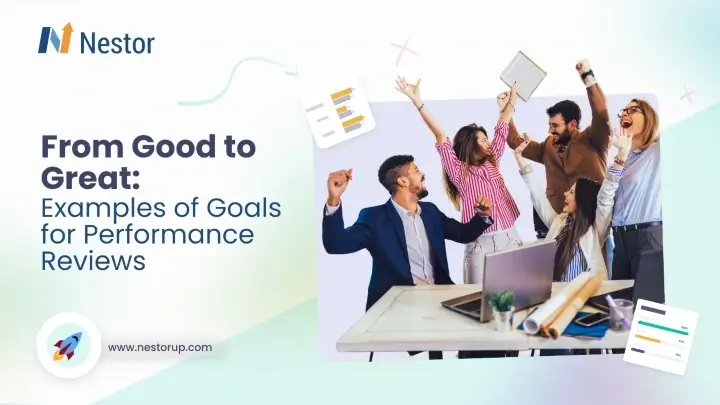
Companies and HR departments always aim for better results and higher profit margins. And this includes efforts to improve manager effectiveness, as well as employee performance. But is that possible given the current context?
The last years have been a challenging time for everybody, especially managers. They’ve faced difficult and novel situations, like hybrid or remote work, return-to-office policies, productivity paranoia, and so on.
And although we’ve left the pandemic behind, the economic situation in a context of a global recession doesn’t look great. Many tech giants, like Amazon and Google, have already started cutting costs and laying people off.
And the managers feel the pressure, as they need to deliver the same (or more) results and productivity with fewer resources. In this context, it is no wonder that according to RedThread Research, 2022:
“Manager effectiveness and engagement have declined 12 percentage points and 5 percentage points, respectively, since 2020.“
So, how can businesses improve manager effectiveness during these times of economic uncertainty and social unrest? According to the same study, there are 7 ways to achieve this, and we’ll explore them one by one:

What managers can do to improve their effectiveness
Remove barriers to getting work done
Some of the most common barriers to getting work done are redundant practices or policies. This is what managers can do to overcome them:
- Employee surveys: Ask for feedback from your team members, especially from new joiners. After spending some time with your company, they’ll be able to highlight the practices or platforms that slow them down or are obsolete. Additionally, use pulse surveys or 1:1 meetings to gather perspectives on the work environment and interactions. This will paint a picture of how your teams work together, the challenges they face, and where they need help.
- Meetings with purpose: Establish that every online meeting must have a clear purpose and objective. It will prevent video calls from dragging on for no good reason. Also, inform your team that if an employee doesn’t benefit from being present or doesn’t have anything to contribute, they don’t need to join or are free to drop off the call at any time.
- Help employees to prioritize: You should help your workforce prioritize their tasks and projects by explaining what’s more important and why. Not every employee has this skill, but you can help them develop it.
- Set clear goals: Ensure that tasks, objectives, and deadlines are clear and transparent to everybody. When job and performance expectations are clear from the beginning, people can focus on the expected outcomes instead of guessing what their work should consist of. OKR templates are a great way for managers to identify objectives, cascade goals among team members, and track progress. This helps align teams and ensures that everyone can focus on what really matters.
Manage difficult conversations effectively
The best way to handle difficult conversations is to first create an organizational culture based on trust and empathy. Together with the strategic help of HR, that’s something managers should strive towards.
A few tips and tricks to have successful difficult conversations as a manager include:
- Develop emotional intelligence: You should try to understand your own feelings, insecurities, and reactions. Getting to know yourself better also allows you to understand your employees. And this will make a difference during uncomfortable conversations. According to the Center for Creative Leadership, “The ability to connect emotionally with employees and lead with emotional intelligence is essential for leadership effectiveness.” To achieve this outcome, you first need to determine if your managers possess these types of soft skills.
- Understand perception and biases: Every story or event has at least two sides. And every person perceives the world through their own experiences, values, and expectations. Carrying these insights into difficult conversations will help you separate what happened, from how you feel about it, from what the employee feels, and from how they see what happened.
- Be specific: Avoid words like ‘always’ and ‘never’, which do not belong in a difficult conversation, especially at work. They are a sign of generalization and in many cases exaggeration. Instead, provide constructive feedback for a specific behavior or task and address each pain point individually.
- Be emphatic, but direct: Even if the discussion is unpleasant and could get emotional, it’s important to remain considerate but honest. It’s not about being harsh but rather showing respect for your people.
- Have a solution-oriented approach: As a manager, you’re bound to have your fair share of difficult conversations. And the best way to approach them is to focus on solutions for the future. Brainstorm with your workforce and come up with efficient ways to address their shortcomings and keep growing together.
Treat employees with respect
Treating your employees with respect is one of the key stepping stones in building trustworthy relationships at work. And while there are many ways to show respect, here are some we highly recommend:
- Transparent communication: As a manager, you need to be transparent and honest with your people, at all times. This applies to goals, difficult conversations, performance evaluations, opportunities for career advancement, and everything in between.
- Listen to your employees: Strive to master listening, which is a real skill, especially active listening. This goes beyond common sense, like not interrupting. It’s about having the intent to understand what’s being said, paying attention to all communication cues, and being non-judgmental.
- Value their time: A great way to be respectful in today’s fast-paced world is not being late and valuing others’ time, which is a limited resource. This can also take the form of flexibility and allow workers to decide how and when they approach projects, as long as the expectations are met.
Foster connections within the team
Fostering connections with your team members improves both manager effectiveness and the overall employee experience at work. Here are a few things you can try:
- Engage with your team: Don’t miss any opportunity to connect with your people and be there for them. Listen to their insights and viewpoints, offer advice for their problems at home, and ask how you can help them do their job better. This is how you become ‘one of them’ and develop stronger connections.
- Get to know each other: Find ways to get to know each other beyond your work and professional approach. Start informal conversations, enjoy lunches or dinners together after work, and be genuinely curious about their passions and interests.
- Celebrate all achievements: You should celebrate and appreciate every achievement and important event in the life of your team members. Whether it’s a small win or the best quarter so far, the birth of a child, or just an anniversary, create a culture of celebration and be just as serious about fun as you are about work.
What organizations can do to improve manager effectiveness
Although managers can take relevant steps to improve their effectiveness, the most important insight from the RedThread Research study is that:
Organizational levels of support for key drivers of manager effectiveness have dropped substantially year over year. This lower level of support drives employees’ overall assessment of lower levels of manager effectiveness.
— Red Thread Research
Or, in other words, to improve manager effectiveness, HR departments and business leaders need to change or, at least improve, the methods and systems that act as support for managers. And how can organizations do that?
Provide data-based insights into the team’s engagement
You cannot improve what you do not measure, and engagement rates, as well as manager effectiveness, aren’t exceptions.
Organizations and HR strategists need to adopt efficient and easy-to-use systems through which they can monitor and gather relevant feedback from employees. These data-based insights will help paint a more accurate picture of the overall engagement levels and will serve as the starting point for identifying solutions.
Deploying such platforms also comes with other advantages, including the option of anonymous feedback. It also gives a voice to anyone, which is extremely useful in companies with a large workforce where not everybody feels comfortable or has the opportunity to be heard.
Provide clarity on what employees need to do to succeed in the future
The truth is that employees want clarity beyond their everyday tasks and performance expectations. They also want to know which career paths they can pursue within their company and what options are available to help them grow and develop their skills and knowledge.
Expectations around personal growth have amplified in the past year, and employees now seek organizations that play an active role in supporting their needs. With the rise of new technologies, employees require more opportunities to develop their skills, such as upskilling or learning new ones, so they can take on new job opportunities. Instead of seeing promotion as their only career goal, they seek mobility options within their organization as a way to switch roles and experience new things that can fulfill them as individuals.
Effective managers will pay attention to these new employees’ desires to pivot, grow, and stretch within their current companies. Doing so can help people reach their full potential and positively impact the organization.
Provide opportunities for employees to connect with coaches outside the organization
Even though the coaching style of leadership is also the one we support and believe in, at Nestor, it does represent a significant shift from the traditional managerial role.
And not all managers may feel comfortable with adopting the role of a mentor. Or, this transition can simply bring additional pressure and a further decrease in their effectiveness.
That’s why the last practice that businesses can take to improve manager effectiveness is facilitating the employees’ access to coaches and trainers outside the organization.
Another option would be expanding or adjusting personal development budgets so that each person in the organization can work with their preferred coach or get access to their learning courses and materials.
In addition to the steps above, Joe Mull, keynote speaker, author and founder of BossBetter Leadership Academy, also highlights the importance of supporting your leaders’ development:
Organizations who want to find and keep devoted employees must invest in manager training and leadership development programs to help those who manage people grow their skills in these areas. These programs must be ongoing and must provide opportunities for managers to gather with their peers (other leaders).
— Joe Mull
How Nestor can improve manager effectiveness
Nestor’s People Intelligence Platform can be the solution for improving manager effectiveness, by providing managers with a variety of tools to better interact and understand each individual’s needs, goals, and strengths. This includes open feedback, surveys, predefined agendas with topics for effective 1:1 meetings, and skills assessments.
Additionally, with a user-friendly interface and transparent goal setting that aligns with the company’s mission and is visible to everyone, Nestor can help senior leaders, HR departments, managers, and employees work together as a flexible team that can overcome any challenge.
Lastly, Nestor can also help map leadership styles across your organization and identify areas where your managers need to improve their soft skills to become better leaders for their teams.








